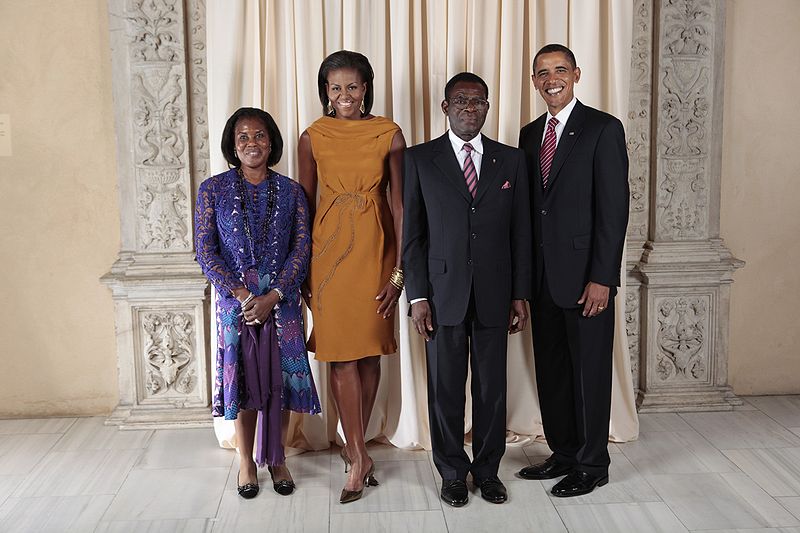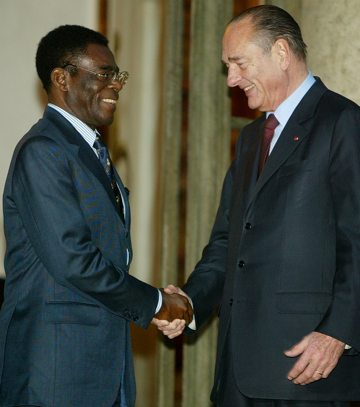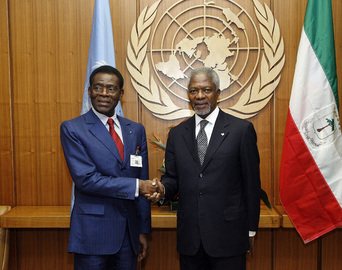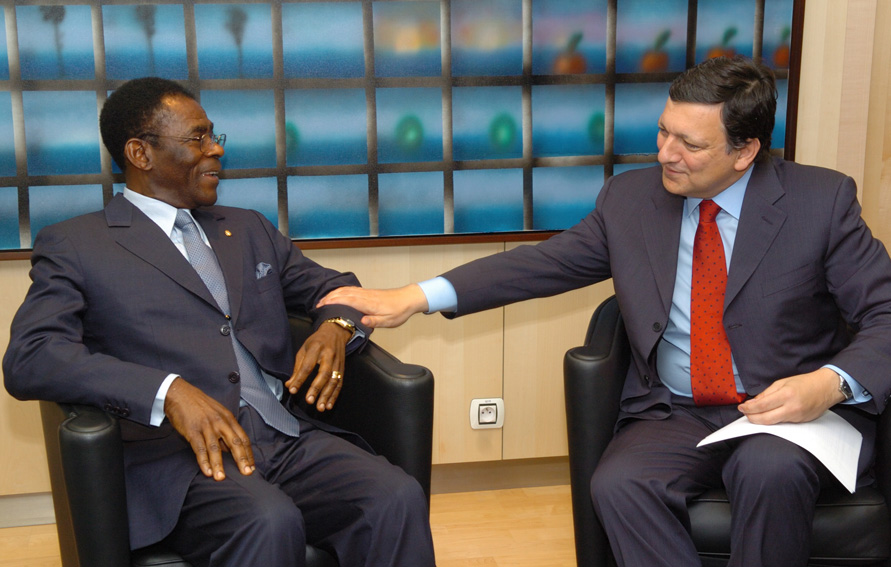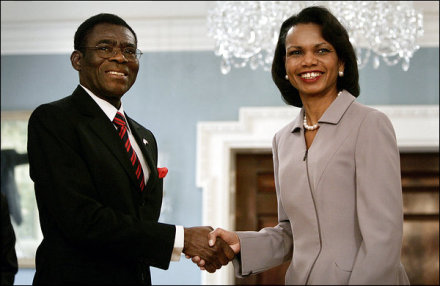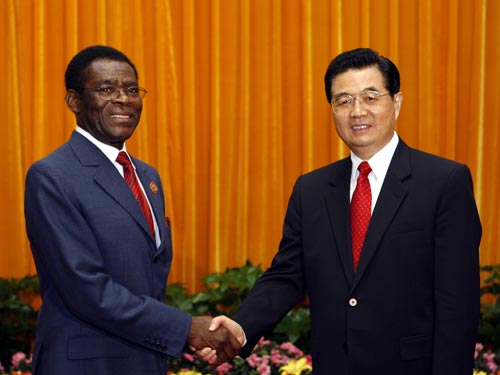<Back to Index>
- Ophthalmologist Allvar Gullstrand, 1862
- Writer Pu Songling, 1640
- Dictator of Equatorial Guinea Teodoro Obiang Nguema Mbasogo, 1942
PAGE SPONSOR
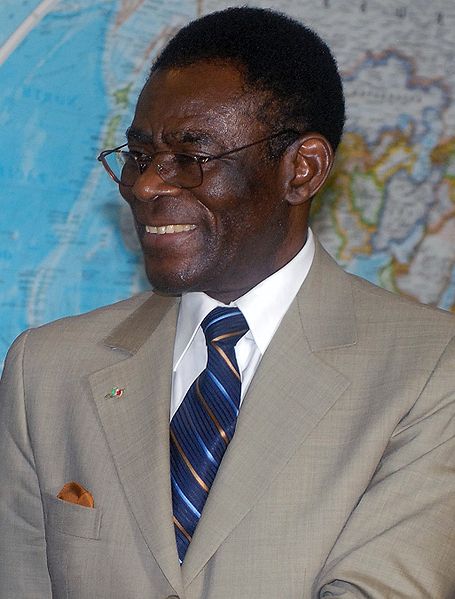
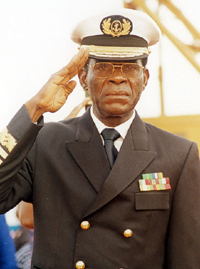
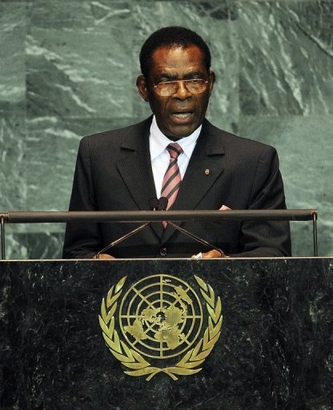
Teodoro Obiang Nguema Mbasogo (born 5 June 1942) is the President of Equatorial Guinea, having served since 1979, and the Chairperson of the African Union.
Born into the Esangui clan in Acoacán, Obiang joined the military during the colonial period, and attended the Military Academy in Zaragoza, Spain. He achieved the rank of lieutenant upon the election of Francisco Macías Nguema. Under Macías, Obiang held various jobs, including governor of Bioko, head of the Black Beach Prison, and leader of the National Guard.
He deposed Francisco Macías Nguema on 3 August 1979 in a bloody coup d'état. Macías was placed on trial for his activities over the previous decade and sentenced to death. His activities had included the genocide of the Bubi. He was executed on 29 September 1979 by firing squad.
Obiang declared that the new government would make a fresh start from Macías' brutal and repressive regime. He inherited a country with an empty treasury and a population that had dropped to a third of its 1968 level, with about 50% of the former 1.2 million inhabitants having moved either to Spain or to neighboring African countries, or being murdered during the dictatorship of Obiang's predecessor. He formally assumed the presidency in October 1979.
A new constitution was adopted in 1982; at the same time, Obiang was elected to a seven year term as president. He was reelected in 1989 as the only candidate. After other parties were permitted to organize, he was reelected in 1996 and 2002 with 98 per cent of the vote in elections condemned as fraudulent by international observers. Again in 2009 he was elected with 97% of the vote, amid accusations of fraud and intimidation, beating opposition leader Plácido Micó Abogo.
Obiang's regime retained clear authoritarian characteristics even after other parties were legalized in 1991. Although his rule was initially considered more humane than that of his uncle, by most accounts it has become more brutal over the years. Most domestic and international observers consider his regime to be one of the most corrupt, ethnocentric, oppressive and undemocratic states in the world. Equatorial Guinea is now essentially a single party state, dominated by Obiang's Democratic Party of Equatorial Guinea (PDGE). In 2008 American journalist Peter Maass called Obiang Africa's worst dictator, worse than Robert Mugabe of Zimbabwe. The constitution grants Obiang wide powers, including the power to rule by decree. All but one of the 100 members of the seat national parliament belong to the PDGE or are aligned with it. The opposition is severely hampered by the lack of a free press as a vehicle for their views. All of the broadcast media are either owned outright by the government or controlled by its allies (the one nominally private radio station, for instance, is owned by Obiang's son).
Abuses under Obiang have included "unlawful killings by security forces; government sanctioned kidnappings; systematic torture of prisoners and detainees by security forces; life threatening conditions in prisons and detention facilities; impunity; arbitrary arrest, detention, and incommunicado detention."
In July 2003, state operated radio declared Obiang to be a god who is "in permanent contact with the Almighty" and "can decide to kill without anyone calling him to account and without going to hell." He personally made similar comments in 1993. Despite these comments, he still claims that he is a devout Catholic and was invited to the Vatican by John Paul II and again by Benedict XVI. Macías had also proclaimed himself a god.
Obiang has encouraged his cult of personality by ensuring that public speeches end in well wishing for himself rather than for the republic. Many important buildings have a presidential lodge, many towns and cities have streets commemorating Obiang's coup against Macías, and many people wear clothes with his face printed on them.
Like his predecessor and other African dictators such as Idi Amin and Mobutu Sese Seko, Obiang has assigned to himself several creative titles. Among them are "gentleman of the great island of Bioko, Annobón and Río Muni." He also refers to himself as El Jefe (the boss). In similar fashion to Idi Amin, Obiang has purportedly allowed rumors that he is a cannibal to circulate. Fictional rumors of cannibalism had been used for centuries among the Fang people of Central and West Africa, of whom Obiang is a descendant, to make opponents fear them. Many testimonies of former residents of Equatorial Guinea, before and during the civil unrest, indicate that cannibalism had been applied as a tool of psychological warfare.
Forbes magazine has said that he is one of the wealthiest heads of state, with a net worth of US$ 600 million. Official sources have complained that Forbes is wrongly counting state property as personal property. In 2003, Obiang told his citizenry that he felt compelled to take full control of the national treasury in order to prevent civil servants from being tempted to engage in corrupt practices. To avoid this corruption, Obiang deposited more than half a billion dollars into accounts controlled by Obiang and his family at Riggs Bank in Washington, D.C., leading a U.S. federal court to fine the bank $16 million.
In 2004 an attempt to depose Obiang was thwarted. One of those involved was Mark Thatcher, son of the former UK Prime Minister. Obiang
had a close relationship with Washington, D.C. based Riggs Bank. He is
said to have been welcomed by top Riggs officials, who held a luncheon
in his honor. (Publicity regarding this relationship would later contribute to the downfall of Riggs.) His
son owns property through his Sweetwater Malibu LLC at 3620 Sweetwater
Road, Malibu, CA. This property has the highest assessed property value
in Malibu. On
November 10, 2010, the Supreme Court of France accepted that the
complaint filed by Transparency International in France on December 2,
2008, is admissible. The Supreme Court’s decision will allow the
appointment of an investigating judge and the opening of a judicial
inquiry into claims that the President has used state funds to purchase
private property in France. An article published in Forbes magazine suggested Obiang has gathered roughly $700 million of the country's wealth in US bank accounts.
Equatorial Guinea's relations with the United States entered a cooling phase in 1993, when Ambassador
John E. Bennett was
accused of practicing witchcraft at the graves of 10 British airmen who
were killed when their plane crashed there during World War II. Bennett
departed after receiving a death threat at the U.S. Embassy in Malabo in 1994; in
his farewell address, he publicly named the government's most notorious
torturers – including Equatorial Guinea's current Minister of National
Security, Manuel Nguema Mba.
No new envoy was appointed, and the embassy was closed in 1996, leaving
its affairs to be handled by the embassy in neighboring Cameroon. Things started to turn around after the September 11 attacks in
2001 on New York and Washington, in the aftermath of which the United
States sought a radical re-prioritization in its dealings with key
African states. On January 25, 2002, the Institute for Advanced Strategic and Political Studies,
a Jerusalem based think tank, sponsored a forum on “African Oil: A
Priority for U.S. National Security and African Development” at the
University Club in Washington, D.C. According to the Institute, "West
African oil is what can help stabilize the Middle East, end Muslim
terror, and secure a measure of energy security. First, the Africa
Initiative is Africa's Turn. And, turning Africa can help turn the
kaleidoscope that will reset misalliances and unseat misrule driven by
oil and murder. It's a policy". Speaking at the IASPS forum, Assistant Secretary of State for Africa Walter H. Kansteiner said,
"African oil is of national strategic interest to us, and it will
increase and become more important as we move forward. It will be
people like you who are going to develop that resource, bring that oil
home, and try to develop the African countries as you do it." In
a lengthy state visit from March to April 2006, President Obiang sought
to reopen the closed embassy, claiming that "the lack of a U.S.
diplomatic presence is definitely holding back economic growth." President Obiang was warmly greeted by Secretary of State Condoleezza Rice, who called him a "good friend", and
Obiang himself was "extremely pleased and hopeful that this
relationship will continue to grow in friendship and cooperation." The
PR company of Cassidy & Associates may
be partially responsible for this change in the relations between
Obiang and the United States government. Since 2004, Cassidy has been
employed by the dictator's government at a rate of at least $120,000 a
month. By October 2006, however, the Senate Foreign Relations Committee had raised concerns about the proposal to build the new embassy on land owned by Obiang himself, whom the United Nations Commission on Human Rights has accused of directly overseeing the torture of opponents of his regime.
